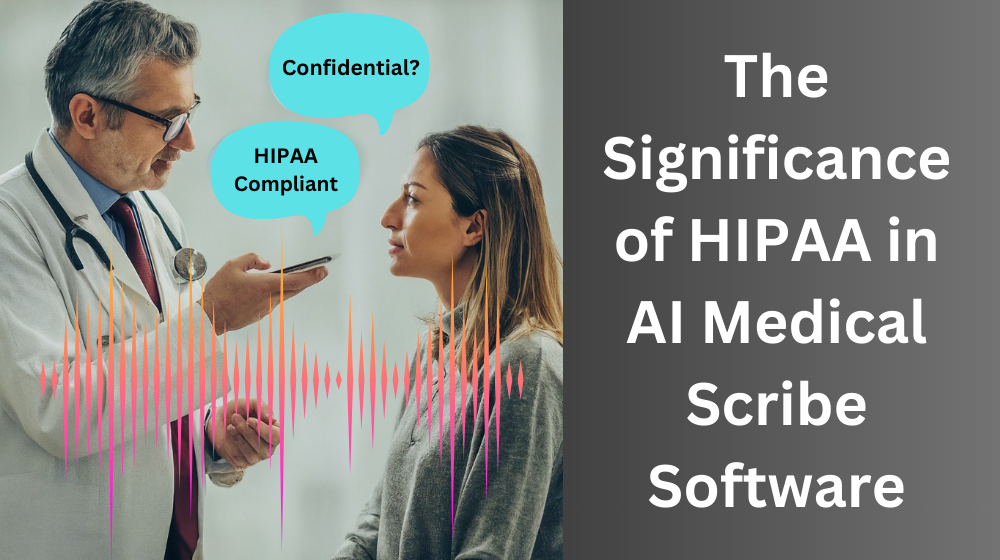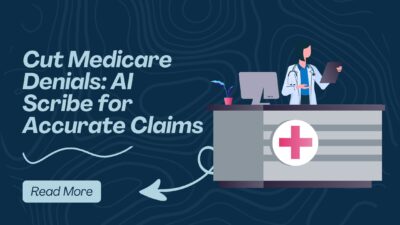Table of Content:
- Introduction
- Importance of HIPAA Compliance in Clinical Documentation
- How Can HIPAA Help with Patient Privacy and Security?
- How Can an AI Medical Scribe Software Ensure HIPAA?
- Conclusion
Introduction
Today, adhering to HIPAA compliance has become really important for any AI medical scribe software and the same goes for clinical documentation. The increasing number of healthcare data breaches has made it more important for individuals to check whether the app or service they’re choosing is HIPAA compliant or not. A study from “The HIPAA Journal” shows that, in the month of September 2023, there were 48 data breaches out of 500 or more records, which is lower than the 12-month average. It means there’s been more data breaches previously which can be a concern to patients’ privacy and security.
In the first half of 2024, healthcare data breaches increased by 15% compared to the same period in 2023, with 52 incidents reported involving over 500 records each, underscoring the ongoing risks to patient information.
So, Even when a physician or healthcare organization opts for an AI medical scribe app to create patient charts and reduce their administrative tasks, they make sure that the app is HIPAA compliant.
- The Objective of the Blog:
- Get to know why HIPAA in clinical documentation is important.
- Learn how HIPAA compliance helps in maintaining patient privacy and security.
- And learn how an AI medical scribe company can ensure HIPAA regulations.
Benefits of Using HIPAA-Compliant AI Medical Scribes
Including HIPAA-compliant AI medical scribes into healthcare practices offers significant advantages in managing patient information securely and efficiently. These advanced tools provide numerous benefits:
- Enhanced Data Security: HIPAA-compliant AI scribes use robust encryption and access controls to protect sensitive patient data, ensuring compliance with federal regulations and safeguarding against unauthorized access or breaches.
- Improved Accuracy: AI scribes help reduce human error by accurately capturing and transcribing patient interactions into detailed medical records. This minimizes mistakes and enhances the reliability of patient documentation.
- Increased Efficiency: By automating routine documentation tasks, AI scribes free up healthcare providers’ time, allowing them to focus more on patient care rather than administrative duties. This boosts overall productivity and reduces clinician burnout.
- Consistent Compliance: HIPAA-compliant AI scribes are designed to adhere to strict privacy standards, ensuring that all documentation processes meet regulatory requirements and reduce the risk of compliance-related issues.
- Scalability: These systems can easily scale to accommodate the growing needs of healthcare practices, making them a versatile solution for practices of all sizes.
By leveraging HIPAA-compliant AI medical scribes, healthcare organizations can enhance security, accuracy, and efficiency while ensuring adherence to crucial privacy regulations.
Importance of HIPAA Compliance in Clinical Documentation
HIPAA (Health Insurance Portability and Accountability Act) is a federal law in the United States that protects the privacy and security of individuals’ PHI (Protected Health Information). A PHI can be any information that identifies a patient’s identity, like name, address, contact number, health conditions, etc. But why is it important for medical professionals and healthcare organizations to ensure HIPAA in their medical documentation?
Here are some reasons:
- It preserves the trust that patients have in medical professionals. Patients trust that private information about their health will be kept private when they divulge sensitive information. A breach of this trust may cause the patient-provider relationship to collapse and impede the delivery of quality care.
- Patients’ right to privacy is safeguarded by patient confidentiality and HIPAA. Personal information that patients may not wish to share with others is frequently included in medical records. Protecting patients’ autonomy and dignity requires protecting their right to privacy.
- Protecting a patient’s private medical information from abuse or damage requires maintaining patient confidentiality with HIPAA. Patients’ chances of finding work and insurance coverage may be jeopardized by unauthorized access to medical records, which may also lead to identity theft, stigma, or prejudice.
- Furthermore, the United States enforces the protection of patient health information through several regulations, including HIPAA. Significant consequences, like fines and damage to the reputation of healthcare organizations, can result from breaking these regulations.
How Can HIPAA Help with Patient Privacy and Security?
HIPAA safeguards patient privacy and security in many ways. Here are some:
HIPAA Established National Standards
Before HIPAA, many states and organizations had different regulations for patient privacy. But HIPAA created national standards for handling PHI which ensures consistent and comprehensive protection across the healthcare sector.
HIPAA has a Limited Data Disclosure Policy
HIPAA dictates specific situations and procedures for disclosing PHI. It generally needs patients’ written authorization before an organization can disclose their information, except for some permitted uses like treatment, payment, and healthcare operations.
HIPAA Gives Rights to Patients
HIPAA empowers patients with control over their information. They have the right to:
- Access their medical records
- Request corrections to inaccuracies
- And, receive an accounting of disclosures made about their PHI
HIPAA has High-Security Measures
HIPAA mandates administrative, physical, and technical safeguards to protect ePHI (electronic protected health information). This includes requiring encryption for sensitive data, access controls, and regular audits to ensure compliance.
HIPAA Holds Different Entities to be Accountable
HIPAA holds covered entities (healthcare providers, health plans, and healthcare clearinghouses) responsible for protecting PHI. This ensures all entities involved in handling patient information are accountable for its security and privacy.

How Can an AI Medical Scribe Software Ensure HIPAA?
An AI-powered medical scribe software works as a healthcare assistant for medical professionals to reduce their administrative tasks and physician burnout. The app captures real-time doctor-patient conversations and creates intricate SOAP notes with medical codes. After the note is generated the doctor can review, edit, and then copy it to their preferred EHR software.
EHR software is mostly HIPAA compliant, but one question that concerns patients and doctors is what about the information that is stored in the scribe app itself? Is it safe or their data can be breached from here?
This is why, just like any medical documentation, maintaining HIPAA compliance in an AI scribe software is equally important. Here’s how an AI medical scribe company can ensure HIPAA:
- They maintain robust data security protocols.
- To protect confidential patient information while it’s in transit and at rest, this app can use industry-standard encryption techniques.
- These apps place stringent access control measures. They use robust authentication procedures and only allow those who genuinely need to know access to patient data.
- They gather and retain only the bare minimum of patient data required for justifiable medical needs. The app reviews and removes superfluous data regularly.
How to Choose the Right HIPAA Compliant AI Medical Scribe Software?
Selecting the right HIPAA-compliant AI Scribe is crucial for healthcare providers aiming to enhance clinical documentation efficiency while safeguarding patient’s confidential information.
Here is a guide to help you make an informed decision:
- Evaluate Data Security Measures: While choosing the best HIPAA compliant AI medical scribe software, ensure that they employ advanced encryption protocols for data at rest and in transit. The software should also include access controls and audit trails to monitor and protect patient details from unauthorized access. So, before selecting, always make sure that the scribe provider follows industry-standard security practices and offers robust data protection features.
- Check Compliance and Certifications: Before choosing, verify that the AI medical scribe software is certified for HIPAA compliance. This includes ensuring that the provider has undergone rigorous security assessments and adheres to federal regulations governing the handling of Protected Health information (PHI).
- Assess Integration Capabilities: The chosen AI Medical scribe software should seamlessly integrate with your existing Electronic Health Records (EHR) systems. This integration is crucial for smooth workflows, reducing the need for manual data entry and ensuring that the clinical documentation is updated in real-time.
- Consider Accuracy and Reliability: While considering HIPAA-compliant Medical Scribe AI, always focus on reviewing its performance in transcribing and managing the clinical documentation procedure. The software should demonstrate the high accuracy in capturing doctor-patient interactions and generating detailed, error-free clinical notes.
- Evaluate Usability and Support: Choose an AI medical scribe with an intuitive user interface and strong customer support. The software should be easy-to-use for the staff and available with reliable support and guidance to alleviate any issues precisely.
- Review Software Cost: While the cost of an AI medical scribe software is a consideration, focus on its value that brings to the healthcare practice. So, when evaluating the investment, always think about factors like improved efficiency, reduced administrative documentation burdens and enhanced data security.
By carefully evaluating these aspects, you can select an AI scribe that not only meets HIPAA compliance standards but also enhances your practice’s documentation processes.
Final Words!
As you can see, even though AI medical scribe software holds great promise for changing the way healthcare providers handle their documentation tasks, many privacy and security concerns need to be maintained. By selecting AI scribe providers that adhere to HIPAA regulations, you can ensure the responsible and ethical use of AI scribes while maintaining your patient’s trust.
You can visit RevMaxx AI if you’re looking for cutting-edge AI scribe solutions that prioritize patient privacy and data security. With our advanced technology and commitment to HIPAA compliance, we offer healthcare providers a reliable and innovative solution that can enhance documentation efficiency and safeguard patient confidentiality. Ready to see RevMaxx AI in action? Request a free demo here. Or, want to experience the benefits yourself? Try RevMaxx AI for free here.









